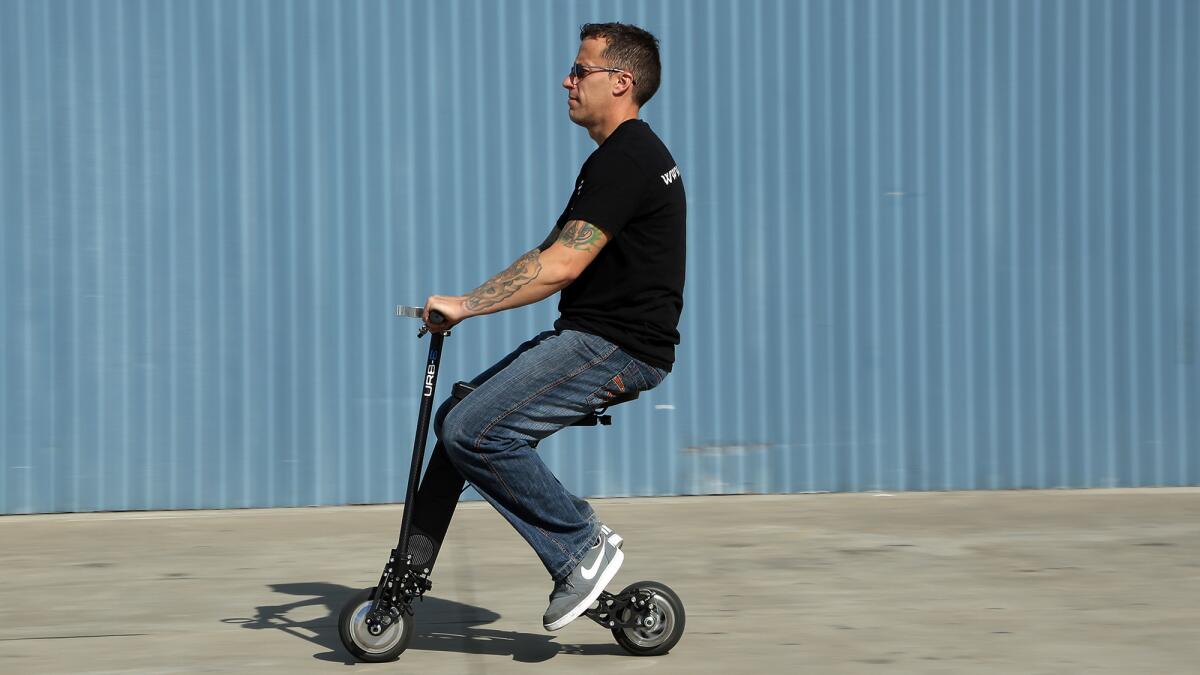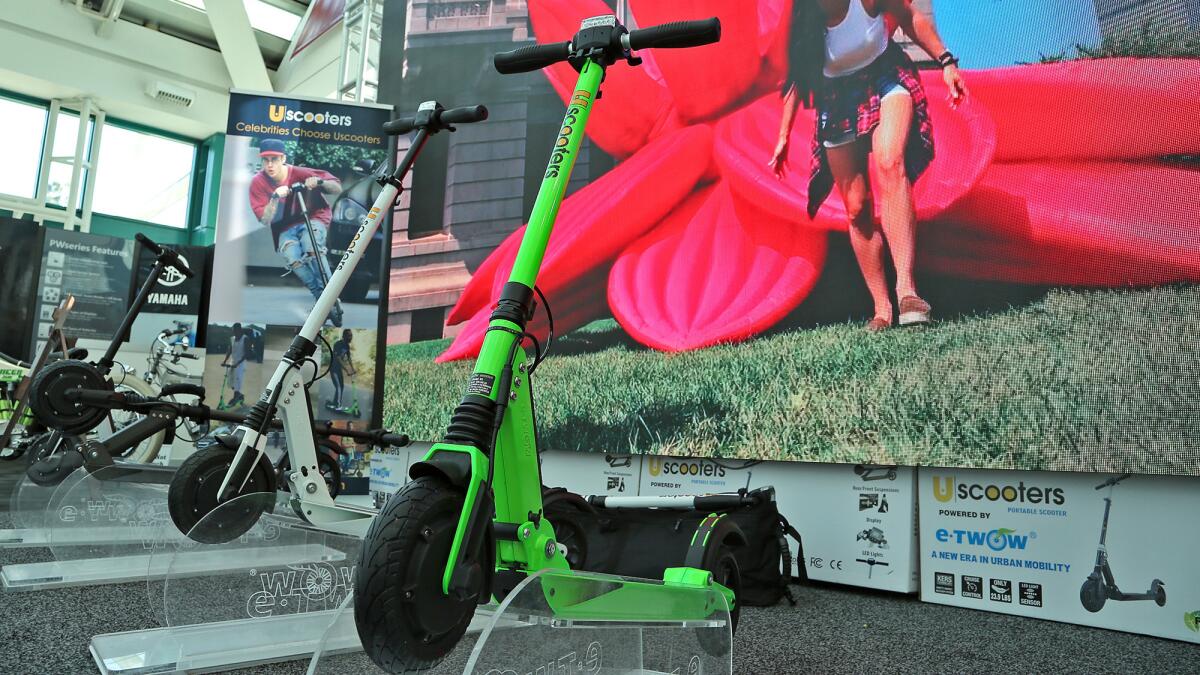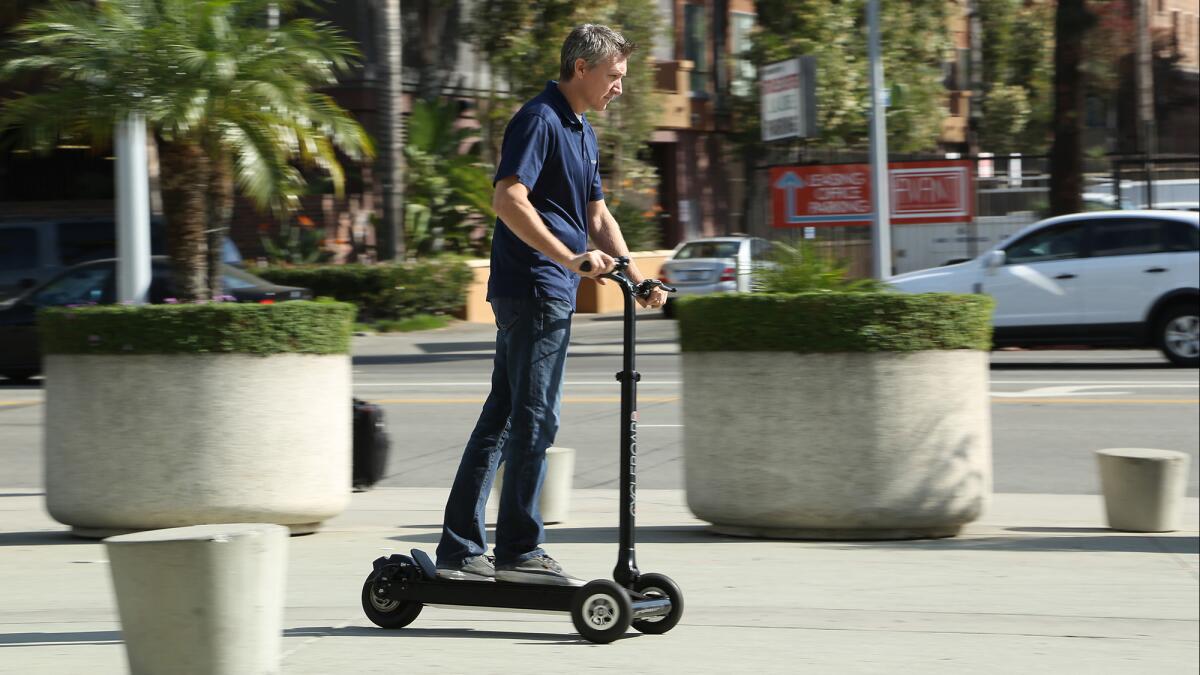What cars? New pavilion at the L.A. Auto Show showcases scooters, electric bikes and hoverboards
It’s one of the largest car events in the world, but a heavily trafficked area of the L.A. Auto Show features precisely zero cars.
The new Go pavilion spotlights so-called personal mobility products to help the adventurous deal with an urban commute. Also known as “last-mile” solutions because they’re often used to bridge the gap between a public transit station and home or work, they include electric scooters, unicycles, hoverboards and other oddball people movers.
The devices are being developed by start-ups and big automakers alike.
Full coverage: 2016 L.A. Auto Show »
Among the devices is Honda’s Uni-Cub, which puts a saddle on top of a balance-controlled wheel “for people who have trouble walking long distances.” Standing a little over knee-high, it’s got the look of a cute little robot, or perhaps the bottom of a toilet.
Ford’s got the Carr-E, a rolling platform disk that resembles a slightly larger Roomba vacuum cleaner; it’s meant to carry luggage or heavy groceries or a standing human being.
The devices, many of them not yet available, might find their market niches but probably won’t be solving any major transport problems or be used for regular commutes.
That’s why the Go section is filled mostly with more mundane but readily usable products like electric scooters and foldable bicycles, stuff people can carry on the Metro or on the bus.
Urban planners and personal mobility marketeers talk a lot about last-mile travel — getting from the subway or the bus to your place of work, or back home at the end of the day. As Metro rail lines expand west, and new residential towers rise around Wilshire Boulevard stops, the last mile (or the last several miles, for a lot of people) becomes a lot more important.
Few if any new streets will be built to accommodate the rising population in large cities. Without big changes, traffic will only grow worse.

So Go exhibitors were pushing products like the Urb-E, a foldable electric scooter. It weighs 35 pounds, can go about 15 miles per hour and travel 20 miles between charges, carrying a single passenger in a sitting position.
The Pasadena company’s co-founders — a graduate of Art Center College of Design and a former Porsche executive — have sold about 2,000 of the scooters since starting a year ago. They cost $1,499 to $1,699, depending on options like a shopping basket, trailer or cellphone holder.
“We want this to replace the golf cart,” Evan Saunders, the company’s head of sales and marketing, said during AutoMobility L.A., the four-day press and trade event that precedes the auto show. “Our customers are people who live downtown and want to leave the car behind, or people who live close to public transport but don’t want to walk to it.”
Nearby, Brad Ducorsky was showing off a motorized scooter that moves at 18.5 mph and, depending on the rider’s weight and how fast it is ridden, covers a range between 13 and 21 miles.
Called the Uscooter, it weighs 23.5 pounds. You can fold it and carry it, or, more likely, pull it along like a wheeled suitcase. Cost: $999.
“It’s great, it’s got a lot of power, and I’m a big guy over 240 pounds,” said Peter Dobias, 50, of Woodland Hills. “I would love this if I was in college; that would be perfect. You pull it out of your car in the parking lot and off you go.”
Why not now? “Hey, I’ve got three kids to haul around.”

Next to Ducorsky’s booth was Phil LaBonty of Newport Beach on his Cycleboard. It’s an electric three-wheel scooter with a platform that looks like a short, wide skateboard. You don’t steer it by the handles; you shift your body like a boarder. It costs $1,299.
LaBonty claims high speed and distance: “At 25 miles range and 25 mph, you can get somewhere,” he said.
Despite its 44 pounds, “it’s a functional commuting,” he said. “You can pull it like a suitcase. Women can drive this in various kinds of shoes and clothes and not feel like they’re going to fall.”
The Cycleboard comes with cruise control, but a potential customer crashed into an exhibit hall post when the cruise control failed to shut off. (The man was unhurt.)

This being the auto show, most of the products on display were equipped with some kind of motor, although downtown bicycle shop Just Ride L.A. did have a British-made Brompton folding bike.
“Getting people excited about a $2,000 folding bike isn’t easy,” said exhibitor Daniel Farahirad, whose family owns Just Ride L.A. “But we’re slowly starting to sell more.”
Of course, you can always turn to the ultimate personal mobility device: your own two feet.



